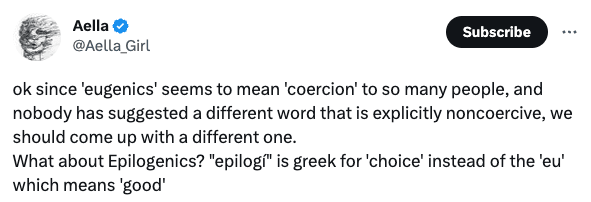I am conditionally in favor of human genetic augmentation. In particular, I think embryo selection for intelligence, health, happiness and other positive traits is desirable. When I bring this up with people, one of the most frequent questions is "Isn't that eugenics?"
I never know how to respond. The term "eugenics" has absorbed so much baggage over the last century that it somehow refers both to swiping right on Tinder when you see an attractive person and to the holocaust.
These are not similar concepts. The fact that we use a single word to refer to both is crazy. I cannot count the number of debates I've heard about human genetic engineering where the disagreement boils down to people misunderstanding what the other is advocating for. One person will talk about the benefits of improving the genes of future generations, and the other person will attack the idea because they mentally associate it with "eugenics", and to them that means "the holocaust" and "state sponsored sterilization of people with disabilities".
The fault lies with the term itself. It means so many different things to so many people that its use actively hinders understanding. For this reason, I think we should start using a new term to talk about non-coercive means of improving human genetics.
Epilogenics: non-coercive means of changing genetics
This term originated with Aella on Twitter, and I think it perfectly fits the purpose I have in mind.
Examples of epilogenics
- Selecting an embryo for lower disease risk, higher intelligence, or some other trait good for both the individual and society
- Gene editing for the purposes listed above
- Choosing an attractive spouse
Examples of things that are not epilogenics
- State-sponsored sterilization of people deemed “unfit”
- Rules against marriage of family members such a siblings and cousins
- Things people think of as eugenics even though they are often bad for genes (i.e. genocide)
I would encourage the use of this term to clarify the difference between genocide and screening one's embryos for desirable traits.


God-like nanotech is about six years after general superintelligence, by my current estimate. I don't at all agree with yud that it comes instantly, you're correct that it's incredibly hard, but it's permitted by physics and the tech is coming soon. So it's worth waiting to ensure that we never introduce genetic changes to the gene pool that are not first tested on the person proposing them. Skin in the game or no playing around with the human genome, imo. Offspring are not the parents' right to control like that.
Maybe if it was available as a basic healthcare service or a free clinical trial, so as to ensure it could never be used to edit offspring's personality.
The key thing I will never accept is giving parents agency over their kids' genome. My parents (my dad, specifically) would have used it to kill me and any parents found to have done such a thing - editing a child's personality-entangled genes - should experience appropriate retaliation from society, which I'd suggest as 12 to 24 months of jail time.